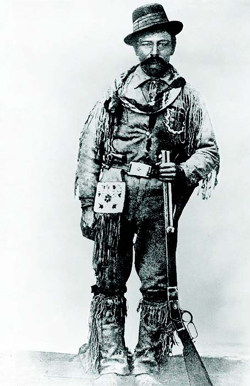Scout, Plainsman
 |
|
Jerry Potts with Henry rifle. ca 1870s |
Perhaps no other man in history had more influence on the Canadian West, the North West Mounted Police, whiskey traders, horse deals, treaties, government officials, chiefs and bureaucrats. He was an uncanny scout, a legendary plainsman, multilingual interpreter, wealthy horse trader and a man renowned for brevity — but he was no saint. His young life was marred by tragedy, hardship and murder yet in the end, this diminutive Métis of the plains earned a full military funeral and an honoured place in the history of the West.
Jerry Potts was born in 1840 at Fort McKenzie, downstream from present-day Fort Benton. His father was Andrew Potts, a Scottish fur trader and his mother was Namo-pisi (Crooked Back) a Blood of the Black Elk band. He was given the name Kyi-yo-Kosi (Bear Child), by his mother’s people.
While still a baby, Jerry’s father was murdered by a Piikani who mistook the elder Potts for another trader that had cheated him. His mother returned to her people, leaving young Jerry behind with trader Alexander Harvey. Malnutrition left him with bowed legs and a stunted stature; neglect forced Potts to fend for himself and as a result grew up quiet and independent.
Again, tragedy struck in his young life. His foster father died, but a kind trader named Alexander Dawson adopted Jerry, insisting the young boy be educated as much as possible. Dawson also taught Jerry the tricks of successful trading, taking the child along on excursions to teach him the business. Later, in his teens, Potts sought out his mother and lived in a traditional manner.
Life on the frontier was harsh and revenge was often fatal. When he was about sixteen, Jerry tracked down and killed his father’s murderer.
He cut quite a figure dressed in beaded buckskin clothing, Stetson hat and two .44 pistols in his gun belt — complimenting the Henry rifle which never left his side. Under his jacket, he always kept two smaller-bore pistols. On his leg was strapped a long-bladed skinning knife. He always kept a small gun inside a hide-away pocket, a practice that saved his life on several occasions.
By the time Potts was twenty-five he had become a comparatively wealthy man through horse trading. The going rate for a good horse at the time ranged between $75 to $150 and his herd rarely averaged less than a hundred horses. Wealth has its privileges and Potts married into the Piikani tribe when he took two sisters, Panther Woman and Spotted Killer as his wives, fathering several sons and daughters.
Potts had also acquired a half-brother when Crooked Back remarried following Andrew’s murder. In 1871, a native known as Good Young Man murdered both his mother and half-brother in a drunken haze. Because their killer had been a native drunk on “firewater,” Potts declared his own personal war on the whisky runners. Mysteriously, several whiskey runners disappeared during the following months. The next year Potts caught up with and killed Good Young Man, shooting him off his horse. Potts spared his victim’s companion, a young man named Morning Writing because Morning Writing had never harmed Potts and a witness would spread the word that Potts had settled the score — adding to his reputation as a man not to be trifled with.
Whenever he travelled to buy and trade horses he would carry cash — often as much as a thousand dollars. People knew he carried such amounts but his reputation preceded him, so he was left alone.
In 1872, Potts moved to Fort Benton and carried on his horse trade. In the fall of ‘74, Commissioner French and Assistant Commissioner James Macleod plus a few men of the North West Mounted Police arrived to replenish much-needed supplies — and hire Jerry Potts. The fresh supplies would ensure the force would get where it was going; and Jerry Potts would ensure that no Mountie ever got lost again.
Their official mission was to travel to Whoop-Up country in Western Canada and shut down American whiskey trading posts. Potts was hired as a guide, more than an able man for the job. He was never paid less than $90 per month, quite a bit higher than the going rate for a guide, and three times a police constable’s salary.
He was fluent in English, Blackfoot and Crow, had a better than average ability in Cree (which he would speak only when necessary), and was passable in Sioux, Assiniboine and Algonquin.
His knowledge of languages and social customs made him invaluable to the NWMP, and he would remain in their employ for the next twenty-two years.
Potts served as an interpreter for the treaty commission during the Treaty 7 talks in September 1877. His weakness in interpretation lay in his habit of brevity. Once, following a Blackfoot chief’s extremely long, flowery, impassioned speech to a delegation of visiting officials who had arrived from Ottawa to sign a treaty with the Blackfoot people, Potts remained silent as if fully digesting the colourful language. Finally, when asked what the chief had said, the laconic Potts shrugged and replied, “He says he’s damned glad you’re here.”
Potts’ succinct interpretation caused serious concern in the treaty commission, enough so that treaty commissioner David Laird ordered Potts replaced and hired James Bird.
Despite his failings at the Treaty 7 negotiations, the NWMP still appreciated Potts’ skills, and he continued to guide and scout for the force until his death of throat cancer on July 14, 1896. He was buried with full military honours at Fort Macleod, Alta.













